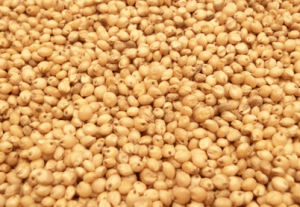Ghana sorghum sector in difficulties – Study
 A study of the sorghum sub-sector has revealed a number of challenges affecting sorghum production and incomes of farmers engaged in the sector.
A study of the sorghum sub-sector has revealed a number of challenges affecting sorghum production and incomes of farmers engaged in the sector.
The study found that even though government was implementing programmes such as mechanized agriculture and input subsidies, challenges such as limited access to tractor services, high cost of inputs and use of recycled seeds resulting in low yields still abound in the sorghum sector.
The study, commissioned by Concern Universal, a non-governmental organization, as part of its Sorghum Value Chain Project, was undertaken in 2014 in some sorghum growing districts in the Brong Ahafo, Northern, Upper East and Upper West Regions.
The project, which seeks to strengthen the various stakeholders along the sorghum value chain to effectively play their roles to improve sorghum production in the country, is being implemented in the four regions with support from the Alliance for a Green Revolution in Africa.
Dr Robert Aidoo, Lecturer at the Faculty of Agriculture, Kwame Nkrumah University of Science and Technology, who presented the findings of the study at a stakeholders meeting in Tamale, expressed need to support farmer groups to procure their own tractors.
The two-day meeting, which ended on Wednesday, and attended by policy makers, researchers, farmers, amongst others, was to review the progress and roles of various partners within the multi-stakeholder Sorghum Value Chain Project.
It was also to review steps to reduce bottlenecks to the development of sorghum production in the country.
Dr Aidoo said supporting farmer groups to procure their own tractors would enable them to plough their fields on time instead of the current situation where many farmers had to depend on one tractor leading to delays in ploughing, which affected yields.
He called for subsidized fertilizer to be released on time to be used during the planting season instead of releasing it when the season was almost over.
He also called for alternative market for sorghum since institutional buyers took only about 10 per cent of the over 296,000 metric tonnes produced leaving the rest for individual buyers.
Engineer Joseph Boamah, Chief Director of the Ministry of Food and Agriculture, whose speech was read on his behalf, assured that government would continue to facilitate the production of certified seeds of some of the improved sorghum varieties to enable farmers have easy access to certified seeds.
Mrs Juliette Lampoh-Agroh, Country Director of Concern Universal spoke about the benefits of sorghum and called for a truly supportive policy and regulatory environment to ensure that all stakeholders within the sorghum value chain benefited.
Mr Abdul-Rahaman Mohammed, President of the Peasant Farmers Association of Ghana said sorghum was essential and supporting farmers to supplement their incomes thereby reducing poverty and called on government to address the challenges associated with the sector.
Source: GNA
